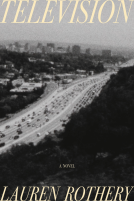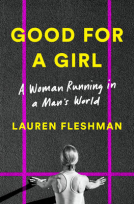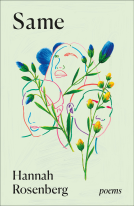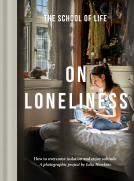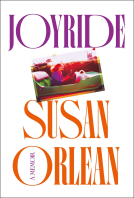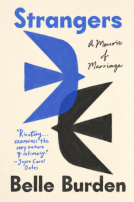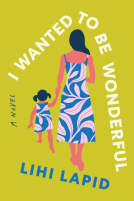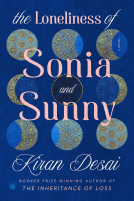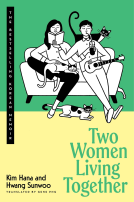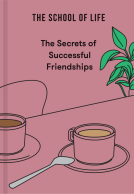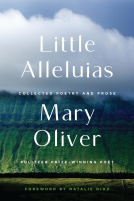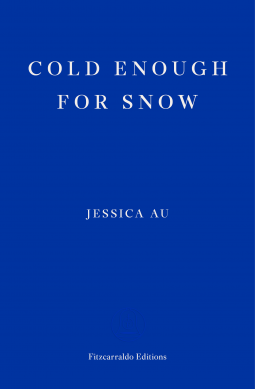
Cold Enough for Snow
by Jessica Au
This title was previously available on NetGalley and is now archived.
Send NetGalley books directly to your Kindle or Kindle app
1
To read on a Kindle or Kindle app, please add kindle@netgalley.com as an approved email address to receive files in your Amazon account. Click here for step-by-step instructions.
2
Also find your Kindle email address within your Amazon account, and enter it here.
Pub Date Feb 23 2022 | Archive Date Mar 07 2022
Description
A mother and daughter travel from abroad to meet in Tokyo: they walk along the canals through the autumn evenings, escape the typhoon rains, share meals in small cafes and restaurants, and visit galleries to see some of the city’s most radical modern art. All the while, they talk: about the weather, horoscopes, clothes, and objects, about family, distance, and memory. But uncertainties abound. Who is really speaking here – is it only the daughter? And what is the real reason behind this elliptical, perhaps even spectral journey? At once a careful reckoning and an elegy, Cold Enough for Snow questions whether any of us speak a common language, which dimensions can contain love, and what claim we have to truly know another’s inner world.
Selected from more than 1,500 entries, Cold Enough for Snow won the Novel Prize, a new, biennial award offered by Fitzcarraldo Editions, New Directions (US) and Giramondo (Australia), for any novel written in English that explores and expands the possibilities of the form.
Please note that the publisher in North America is New Directions. The ISBN for their edition is: 9780811231558. The publication date is 1 February 2022 and the price is $14.95 USD. The publisher in Australia and New Zealand is Giramondo. The ISBN for their edition is: 9781925818925. The publication date is 1 February 2022 and the price is $24.95 AUD.
Advance Praise
‘Rarely have I been so moved, reading a book: I love the quiet beauty of Cold Enough for Snow and how, within its calm simplicity, Jessica Au camouflages incredible power.’
— Edouard Louis, author of The End of Eddy
‘Au’s writing ebbs along effortlessly and poetically.’
— The Australian
‘Jessica Au is a new talent to be watched.’
— Romy Ash, Australian Book Review
Available Editions
| EDITION | Paperback |
| ISBN | 9781913097769 |
| PRICE | £9.99 (GBP) |
Featured Reviews
 Reviewer 876149
Reviewer 876149
Cold Enough for Snow is a beautifully-observed, deceptively simple piece, brief but dense, pared down yet at the same time rich and intricate. On the surface it’s a straightforward story told in the first person by a daughter reflecting on her relationship with her mother, one that’s both frustratingly distanced and unavoidably intimate. They meet up in Japan for a holiday, spend time walking through quiet streets, visiting art galleries and shrines. Their conversations are curiously one-sided dominated by the daughter’s eagerness to share her insights with her mother about everything they encounter, in an almost-teacherly manner. As their time together passes, memories of the past start to unfold in the narrator’s mind. Gradually their life stories are uncovered, the mother’s birth in a small village – presumably in mainland China – and her childhood and youth in Hong Kong, the daughter’s slow parting with her family, her new life stirred by desires opened up by study and by experiences that are vastly removed from those of her mother’s. A mother who left Hong Kong for a country where she could no longer speak in her original Cantonese, close to her children but separated by the gulf created by their different languages and cultural settings.
It’s an enigmatic novel, with an underlying air of melancholy, that sometimes has the feel of a tone poem, with elements in the text suggesting that circumstances may be other than they appear. At one point the narrator talks to her mother about pentimento, the way in which a finished painting may hold hidden traces of earlier versions, a figure or a form obscured, something small perhaps or something significant enough to change its entire meaning. Writing the narrator says can be the same way, a glossing over or a reworking to transform reality into what we wished it might have been, and for that reason it’s not to be trusted. One wish that seems significant here is the daughter’s longing to overcome a sense of dislocation, the splitting that occurs between generations when a parent’s an immigrant, uprooted and cut off from their history. It’s also a highly visual piece, numerous vivid, detailed references are made to art, nature, the scenery and sounds of Japan. In this way Jessica Au foregrounds the act of seeing, sometimes this works as metaphor but at others it’s more about immediacy and the whole process of being in the world.
I found myself totally immersed in Au’s writing, her prose is nuanced, fluid and sensitive, admirably disciplined, offering up a meticulously constructed representation of two lives in miniature - at a little over ninety pages this is closer in scale to a novella than a full-fledged novel. Au, a Chinese Australian writer who’s worked as a bookseller, editor and journalist, won the inaugural Novel Prize with this, her second book, and as part of that Cold Enough for Snow will be published simultaneously in the U.K. by Fitzcarraldo Editions, in the U.S. by New Directions and in Australia by Giramondo, as well as made available in translation in a range of territories, and on the strength of this she more than deserves the recognition that this should bring.
Rating: 4.5
 Paul F, Reviewer
Paul F, Reviewer
As we walked, she asked me about my work. I didn’t answer at first, and then I said that in many of the old paintings, one could discover what was called a pentimento, an earlier layer of something that the artist had chosen to paint over. Sometimes, these were as small as an object, or a colour that had been changed, but other times, they could be as significant as a whole figure, an animal, or a piece of furniture. I said that in this way too, writing was just like painting. It was only in this way that one could go back and change the past, to make things not as they were, but as we wished they had been, or rather as we saw it. I said, for this reason, it was better for her not to trust anything she read.
Jessica Au's Cold Enough for Snow won the inaugural Novel Prize, run by Giramondo, New Directions and Fitzcarraldo Editions, and is a very worthy recipient of the award. It opens:
When we left the hotel it was raining, a light, fine rain, as can sometimes happen in Tokyo in October. I said that where we were going was not far–we would only need to get to the station, the same one that we had arrived at yesterday, and then catch two trains and walk a little down some small streets until we got to the museum.
The narrator of the novel is a young woman, on a trip to Japan with her mother, in October although whenever I’d asked her what she’d like to visit in Japan, she’d often said she would be happy with anything. The only question she’d asked once was whether, in winter, it was cold enough for snow, which she had never seen.
The narrative strand of the novel is relatively slight, the two women travelling to various museums and galleries in Tokyo, and then on to Osaka and Kyoto. But the true story comes from the anecdotes, memories and recounted conversations the narrator shares with her mother, and which lead her off into reflections of her own.
As the novel progresses, we learn a little of the family back story. The narrator's mother was born in a rural village but moved to Hong Kong, where the narrator was born. But when the narrator was young the family moved to an English speaking country (I assumed Australia, although not named) and the narrator grew up with English as her primary language.
The prose is beautifully polished and the effect (perhaps significantly) elegiac
Earlier, he had pointed out the wild orchids growing in the cracks in the rocks, and I noticed in him, as with Laurie, the ability to pick out the small details of the world, or to see things that others might miss. It was, I suspected, something he did unconsciously, or automatically, not realising how it would return later in the sculptures he made, or the things he said. But then again, perhaps he did know, and cultivated it, as one nurtured a new plant.
And, in a relatively non-linear series of recollections, there are several recurrent motifs, including East Asian porcelain, at first much coveted in the West but later imitated, clothes (typically elegant but understated) as a literal or metaphorical uniform, and the contemplation of art. As our narrator remarks: I felt that if only I could connect these things better, then I might truly have come to realise something.
There are flavour here of the ambiguous prose of one of Gabriel Josipovici’s narrators, told in the indirect fashion of Rachel Cusk’s Faye and the restrained prose of Kazuo Ishiguro, whose Never Lewt Me Go the author once singled out as her favourite novel; commenting “The way he uses narrative structure, with those drips of detail and memory, completely floored me the first time I read it. Even the title, which, when you think about it, holds such beautiful sadness – it’s a command for something that can never really be done.”
But Jessica Au carves out something quite beautiful and unique. And kudos (Cuskian pun intended) to the publishers behind the prize for awarding it to a perfectly formed brief novel rather than the tomes that seem to grab most literary attention.
4.5 stars
This quiet novella took me by surprise. The deceptively simple premise of a mother/daughter trip to Japan unfurls and expands as sensory memories spark the unnamed narrator to relay stories of the past; her past as well as third-person retellings in a fluid stream of consciousness. As the timeframe slips back and forth, I often lost myself in the memory to the point that I lost track of what was happening in the story. Jessica Au writes beautifully and precisely and gently leads the reader down several paths to contemplate.
Thanks to NetGalley and New Directions/Fitzcarraldo Editions/Giramondo for the opportunity to read this ARC.
I was drawn to this book by its title and its description sparked my interest.
Winner of the inaugural Novel Prize, Cold Enough for Snow is the story of the unnamed narrator and her mother visiting Japan for a holiday. They meet in Tokyo airport having both arrived from an unnamed country and they haven’t seen much of each other in recent years.
The narrator has meticulously planned their trip . They visit galleries and museums, eat in small restaurants and walk in the rain.
Initially it reads like a travel diary. Everything is beautifully and precisely observed and captured and as their holiday unfolds we learn more about them both as memories return to the narrator.
I read this in one sitting, it almost hypnotised me. I found myself questioning elements of the story but only lightly so, (more so now that I have finished it) I was questioning the narrative whilst being wholly absorbed in the story. I was enchanted ,unsettled and moved by the ending. This is one I’ll buy and reread and recommend.
An exceptionally well written, thought provoking compelling read.
4.5 ⭐️⭐️⭐️⭐️
 Sarah C, Reviewer
Sarah C, Reviewer
This is a quiet book, full of gentle detail. A woman and her mother go on holiday together to Japan. The brief time they spend together gives space for the writer - the daughter - to reflect on their relationship, on her own relationship with her partner, and on her mother's youth. They visit exhibitions, they go shopping, they travel on public transport - we get to know them through their responses to these events. We see the mother through the daughter's eyes. How well can you ever know someone? It left me reflecting on myself as daughter, and as mother. It's an understated gem.
Thank you, NetGalley, for letting me read this.
This book is beautifully paced like a gentle stroll in nature, taking in the scenery. I really enjoyed the relationship between the mother and daughter as they travelled to Japan. to spend some time together. We read from the daughter's viewpoint, as the narrator, with only a guess at the mother's feelings or thoughts on the various aspects of the trip. There was plenty of room to come to your own conclusions which I enjoyed very much, giving me the ability to look at situations from both sides. The daughter has more than a passing interest in galleries and artefacts and this is woven through the story as settings for the dialogue and memories that arise as they travel through Tokyo. I was delighted by the details of travel, the food and overnight stops that added another dimension onto the slow paced ordinariness of this interesting story.
 Book Trade Professional 651882
Book Trade Professional 651882
A short and detailed book, with a lot left unsaid - much like the relationship between our narrator and her mother.
A woman and her mother go on holiday together to Japan, after not seeing much of one another in the past few years. The holiday is spent by the daughter reflecting upon their relationship with one another, as well as the daughter's relationship with her own life, past and present. The duo visit exhibitions, go shopping, travel to different cities - we get to know their relationship through these events. The mother and daughter are not the main characters of the book, but rather the mother-daughter relationship. We see the mother through the daughter's eyes, how the daughter thinks the mother is feeling or what she wants to do - as "anything will do" is the response the mother gives. There is one part where the daughter notices her mother wants to go into a shop - the mother does not say so, but the desire is felt by the daughter. The mother-daughter relationship is not the usual type we read in books or see in film - where the mother and daughter are either super close best-of-friends or don't get along. It is very much a bond of relationship in this book, they have a relationship because they are mother and daughter, not despite the fact. They spend an entire holiday together, and we don't know if they talk about any "serious" issues - it could easily be a teenage daughter on a shopping trip with her mother. I could feel the love in the pages the characters had for one another, and it spread through me.
 Librarian 766039
Librarian 766039
A mother and her grown daughter meet in Japan for a holiday, spending time in Tokyo, Ibaraki and Kyoto. As they visit shrines and other attractions they talk - the daughter, as narrator, also noting what is also unsaid and not shared.
I thought it was a beautiful meandering meditation on family, changing roles within a family, the mother-daughter relationship and also a meditation on memory, identity, of ‘otherness’.
I absolutely loved this novella and will highly recommend to friends.
Huge thanks to Netgalley and the publishers, Fitzcarraldo Editions, for making this ARC available to me for a fair and honest review.
 Oliver R, Book Trade Professional
Oliver R, Book Trade Professional
I've never read a Fitzcarraldo Editions book that I didn't love, and this is no exception.
It hits a lot of sweet spots for me: beautiful writing, a very simple narrative, a sort of melancholia drifting over everything.
There's an uncertainty about what is really happening, which is eerily at odds with the meticulous transcription of minor details. I have a soft spot for being told about things like red woollen socks, and smalls bowls of rice, and thick notepaper. The pliability of memory is somehow set against this faithful rendering of actual things, and the novel is both immediate and remote.
I think it is about art and grief and language and memory and, most of all, intimacy. It's quite painful to read, for such a quiet book, and it is the perfect length for that.
My thanks to Fitzcarraldo Editions and NetGalley for the ARC.
Readers who liked this book also liked:
Kim Hana; Hwang Sunwoo
Biographies & Memoirs, Nonfiction (Adult), Parenting & Families
The School of Life
Health, Mind & Body, Parenting & Families, Self-Help

